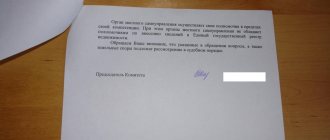Official website of the Supreme Court of the Russian Federation
From what moment does the punishment of a convicted defendant begin to be calculated, what is the difference between the articles of the Criminal Code on calls for terrorist activities and inciting hatred and enmity and whether they can be mutually exclusive, how to correctly qualify the actions of collectors of wild narcotic plants, the Supreme Court of the Russian Federation explained in its review of judicial practice.
Day of detention
“The day of actual detention of a person found guilty of committing a crime shall be counted towards the term of serving his sentence,” the Supreme Court points out.
He cites the example of the verdict of the West Siberian District Military Court, according to which two defendants in the case received real sentences. At the same time, the court counted the time of detention and the date of detention into their sentence - from January 14, 2021.
However, during the trial, one of the witnesses testified that the suspects were actually detained a day earlier - on January 13. The defendants in the case were detained in Krasnoyarsk, from where they moved to Abakan, where the investigation took place; the arrest report was drawn up the next day, so it contained the wrong date.
“By virtue of the set of rules governing the rules for calculating the amount and beginning of the term of serving a sentence, namely part 7 of article 302 and paragraph 9 of part 1 of article 308 of the Code of Criminal Procedure of the Russian Federation, the term of serving a sentence for a person who was kept in custody before the sentencing must be calculated from the date of the sentencing including in this period the time of his detention from the day of detention until the day of sentencing.
Consequently, the day of actual detention of a person found guilty of committing a crime shall be counted towards the period of serving his sentence,” the highest authority emphasizes.
In this regard, the judicial panel for cases of military personnel of the Armed Forces of the Russian Federation changed the sentence and included in the sentence the day of actual detention, and not indicated in the protocol (appeal ruling No. 206-APU18-2).
Articles 282 and 205.2 of the Criminal Code of the Russian Federation are not competitors
Articles on public calls for terrorism and incitement to hatred and enmity encroach on different objects, have different subjective characteristics and objective aspects and are not competing, explains the RF Armed Forces.
In the review, he analyzes the verdict of the Far Eastern District Military Court of January 23, 2021, issued in a special manner. The court found the person involved in the case guilty of publishing videos on the Internet with propaganda to join the Islamic State organization banned in the Russian Federation. The accused received 2 years in a penal colony for publicly calling for terrorist activities and publicly justifying terrorism.
At the same time, the court excluded from the charges the article on inciting hatred and enmity, as being overly imputed. The first instance indicated that the illegal actions of the convicted person were committed with one intent, aimed at disseminating materials and information calling for terrorist activities, justifying and justifying the ISIS organization, one of the goals of which, as established by the decision of the Supreme Court of December 29, 2014, is to conduct the so-called holy war with infidels throughout the world, and therefore they form a single ongoing crime provided for by a special criminal law norm - part 1 of article 205.2 of the Criminal Code of the Russian Federation (as amended on December 7, 2011).
“Meanwhile, in accordance with the provisions of the criminal law, crimes encroach on various objects: Article 205.2 of the Criminal Code of the Russian Federation - on public safety and the safety of institutions of society and the state, Article 282 of the Criminal Code of the Russian Federation - on the foundations of the constitutional system, the constitutional rights of citizens, their honor and dignity,” - reminds the Sun.
Also, the two articles have different objective aspects of the crime - according to 205.2 it is expressed in public calls for terrorist activities or public justification of terrorism, and according to 282 it is characterized by actions aimed at inciting hatred or enmity, as well as humiliating the dignity of a person or group of persons on the basis of gender , race, nationality, language, origin, attitude to religion, as well as belonging to any social group.
“A mandatory feature of the subjective side of the crime provided for in Article 282 of the Criminal Code of the Russian Federation, in contrast to the subjective side of the crime provided for in Article 205.2 of the Criminal Code of the Russian Federation, is a certain special purpose - inciting hatred or enmity, as well as humiliating the dignity of a person or group of persons on certain grounds.
Thus, contrary to the conclusion of the district military court, the offenses provided for in Articles 282 and 205.2 of the Criminal Code of the Russian Federation are not general and special norms of criminal law in relation to each other, and therefore they cannot compete with each other in this sense,” notes the Supreme Court RF.
The Judicial Collegium for Military Affairs changed the sentence and included punishment for inciting hatred and enmity (appeal ruling No. 208-APU18-3).
Plant collection
A person detained while directly collecting narcotic plants cannot be held criminally liable for drug possession; his actions are considered the acquisition of prohibited substances.
The Supreme Court refers to a case in which the accused collected wild hemp for personal use. When he saw the police officers, he threw his backpack on the ground. It was subsequently established that the backpack contained 232.40 grams of the drug.
The court of first instance qualified the actions of the accused under Part 2 of Article 228 of the Criminal Code of the Russian Federation as illegal acquisition and storage without the purpose of selling narcotic drugs on a large scale. He was sentenced to 3 years in prison.
“The cassation court changed the verdict and excluded from the conviction illegal possession without the purpose of selling a narcotic drug on a large scale, since from the description of the criminal act it is clear that the accused, upon seeing the police officers, immediately threw away the narcotic drug,” the review says.
In this regard, the court considered it possible to change the sentence of the defendant in the case and decided to consider the deprivation of liberty suspended (definition No. 92-UD17-11).
Legislative basis
The main legal act regulating the actions of employees is Federal Law No. 3-FZ of 02/07/2011. According to Art. 13 of this law, a police officer, in order to exercise his official powers, has the right to detain and deliver a citizen to the department.
Detention is considered to be a restriction of the actual possibility of free movement of a citizen. In this case, the police have the opportunity to deliver the detainee to the body of inquiry or investigation.
In paragraph 2 of Art. 14 of Law No. 3-FZ lists the grounds for detaining a person. These include:
- commission of an offense by a citizen;
- finding a person on the wanted list;
- evasion of execution of a penalty imposed by the court;
- drawing up a protocol on an administrative offense;
- suicide attempt;
- identification;
- the presence of severe mental disorders.
A police officer has the right to detain a citizen even if he does not have precise evidence, but only has a suspicion that the person has violated something.
How the procedure works
The procedure is regulated by Art. 14 of Law No. 3-FZ. When arresting a police officer, he must:
- introduce yourself;
- present your official ID;
- state the reason for the appeal;
- explain the rights and obligations of the detainee;
- draw up a detention report.
When carrying out the procedure, the police officer must observe and respect the rights of the citizen. An employee is strictly prohibited from humiliating a person, resorting to physical violence or cruel treatment.
If the detained person has personal belongings or vehicles with him, they may be subject to search by an officer. In this case, the police officer is obliged to ensure the presence of at least 2 witnesses or conduct a video recording of the search.
If the employees searched the personal belongings of the detained person, then a record of this is made in the arrest report, or a separate document is drawn up - the search report, in which the witnesses put their own signatures.
Personal search of a citizen by a person of the opposite sex is not allowed, that is, a woman should be searched by a woman, and a man by a man.
After arrest, the citizen is taken to the police department, where he is placed in a specially designated room, having previously been examined for beatings, abrasions or other bodily injuries.
Use of physical force against a detainee
A police officer has the right to use physical force against a person subject to arrest for the purposes of:
- suppression of a crime or administrative offense;
- delivery and detention;
- overcoming opposition to his legitimate demands.
In other cases, the employee does not have the right to physically influence the detained citizen.
Before using physical force, the employee is obliged to warn about this and provide the person with the opportunity to voluntarily comply with his demands. Without warning, a police officer may use force only in a situation where delay could endanger the lives of others or his own.
To suppress resistance to the actions of a police officer, special means can be used on a detained person - sticks, stun guns, handcuffs and others.
Duration of detention
The time during which a citizen can be restricted in movement by police officers depends on the reasons why he was taken to the department.
Administrative detention cannot last more than 3 hours, but if the offense committed provides for arrest as a measure of liability, then the time increases to 48 hours, or until the case is considered in court. By decision of the judicial authority, the period of detention may be extended to 72 hours. If, after this time, suspicions of an offense are not confirmed, then the police are obliged to release the citizen. By decision of the court, another preventive measure may be chosen, for example, arrest.
It is prohibited to detain persons listed in paragraph 2 of Art. for more than 3 hours. 3.9 Code of Administrative Offences. Such persons include pregnant women, teenagers, mothers raising children under the age of 14, disabled people of groups 1 and 2, military personnel, employees of the investigative committee, the ATS system, the Main Directorate of the Federal Penitentiary Service, fire-fighting and customs authorities.
What not to do
To prevent simple detention from becoming a reason for initiating criminal proceedings, the detained person should under no circumstances:
- shout or insult an employee;
- try to escape or escape;
- use physical force against a police officer;
- resist the employee's demands;
- touch foreign objects in the investigator/interrogator’s office;
- sign documents without a lawyer (if you disagree with the contents of the document, sign the document only with a handwritten note “disagree with...”);
- lie or invent facts that did not exist.
There is also no need to provoke employees into conflict or threaten them. A policeman is the same person, and he also has the right to be treated with respect.
Attempting to escape or resisting employees will be considered disobedience to legal requirements. Such an offense is punishable by a fine of 1,000 rubles or arrest for up to 15 days.
Rights of the detainee
A citizen detained by police officers has the following rights:
- ask the employee to show identification and introduce himself;
- find out the reason for the detention;
- receive an explanation of your rights and obligations;
- make a phone call to notify relatives about delivery to the station;
- engage a lawyer to protect your own interests;
- give evidence or refuse to give evidence;
- receive medical assistance if it is required at the time of detention;
- do not testify against yourself or your relatives;
- gets acquainted with the protocol of detention or search, and also makes comments on them;
- receive a copy of the protocol.
All protocols drawn up at the time of arrest must be signed by the person who was detained. In this case, the detained citizen may not agree with the contents of the document. In this case, he has the right to refuse to sign, about which a corresponding entry is made in the protocol. He can also sign the protocol with a reservation, for example, by writing a phrase that he partially agrees with the content, while indicating what specifically he does not agree with.
If a citizen of a foreign state is detained, he has the right to give evidence and receive explanations in his native language. For these purposes, police must hire an interpreter. This service is free for a person.
In the case where the detainee is a minor child, the police are obliged to independently notify his legal representatives about the detention at the station.







